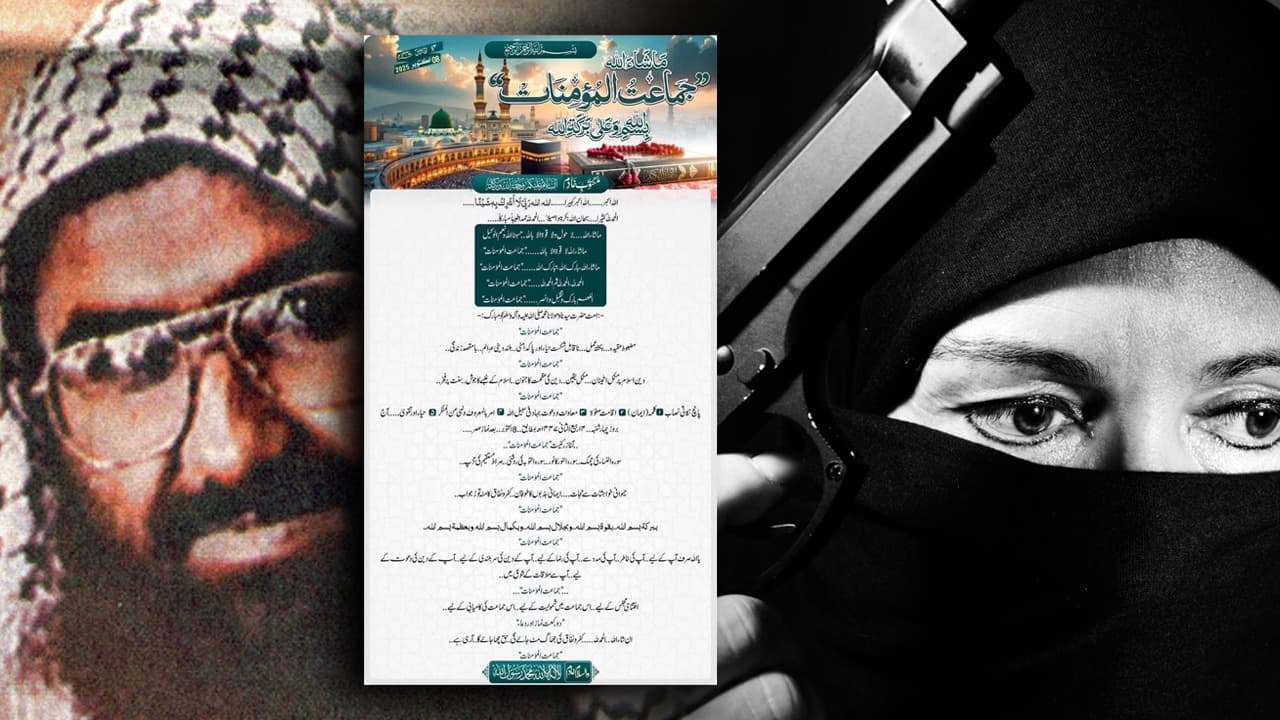Jaish-e-Mohammed launches its first-ever women’s brigade, Jamaat-ul-Mominaat, led by Masood Azhar’s sister. Recruitment begins in Pakistan, signaling a dangerous shift toward female combatants and potential suicide attacks.
In a chilling development that highlights Pakistan’s deepening nexus with terror groups, Jaish-e-Mohammed (JeM), the notorious Pakistan-based terrorist organization, has announced the formation of its first-ever women’s wing — the “Jamaat-ul-Mominaat.” The decision, revealed in a letter issued under the name of JeM chief and UN-designated terrorist Maulana Masood Azhar, marks a dangerous shift in the outfit’s operational strategy. Recruitment for the new brigade began on 8th October 2025 at JeM’s Markaz Usman-o-Ali in Bahawalpur, Pakistan.
According to the letter, circulated via JeM’s propaganda platform Al-Qalam Media, the women’s brigade will officially operate under the name Jamaat-ul-Mominaat. Sources reveal that the brigade will be led by Sadiya Azhar, Masood Azhar’s sister. Sadiya’s husband, Yusuf Azhar, was killed in Operation Sindoor on May 7, 2025, when Indian forces struck JeM’s headquarters at Markaz Subhanallah.
Scroll to load tweet…
Women on the Frontlines: JeM’s Dangerous New Strategy
Traditionally, JeM — a Deobandi-rooted outfit — had strictly barred women from participating in armed jihad or combat missions. However, sources indicate that the Pahalgam terror attack and Operation Sindoor prompted a change in strategy. Masood Azhar, along with his brother Talha al-Saif, jointly approved the decision to incorporate women into JeM’s operational framework, paving the way for this exclusive female brigade.
The recruitment drive reportedly targets wives of JeM commanders as well as economically vulnerable women studying at JeM-run centers in Bahawalpur, Karachi, Muzaffarabad, Kotli, Haripur, and Mansehra.
Security analysts note that while global terrorist groups such as ISIS, Boko Haram, Hamas, and LTTE have historically deployed women as suicide attackers, Pakistan-based terrorists groups like Jaish-e-Mohammed, Lashkar-e-Taiba, and Hizbul Mujahideen have largely avoided doing so.
Experts now believe that JeM’s creation of Jamaat-ul-Mominaat signals a new intent to train and deploy female suicide bombers in future terror operations, representing a dangerous evolution in the outfit’s tactics.
Pakistan’s Terror Machinery: A Coordinated Threat
The formation of JeM’s women’s brigade comes alongside continued anti-India rhetoric from other Pakistani terror groups. On 7th October, Saifullah Kasuri, deputy chief of Lashkar-e-Taiba (LeT) and mastermind behind the Pahalgam attack, issued a public threat to Prime Minister Narendra Modi via a widely circulated video.
In the clip, Kasuri praises Pakistan Army Chief General Asim Munir, calling him “Field Marshal,” and urges him to “teach a lesson to PM Modi like we did on May 10, 2025.” He claims to act “in the name of flood relief work,” while accusing India of “water terrorism” and deliberately triggering floods in Pakistan.
The timing of Kasuri’s threats is telling. Pakistan’s political leadership, including Prime Minister Shehbaz Sharif, has raised the Indus Water Treaty issue repeatedly on global platforms while continuing to ignore cross-border terrorism emanating from its own soil.
Scroll to load tweet…
The Road Ahead: India on Alert
Security agencies in India will closely monitoring developments. Analysts warn that the Jamaat-ul-Mominaat could be used in high-profile attacks, including suicide missions targeting civilians, political leaders, and security personnel.
For India, the message is clear: Pakistan continues to weaponize terrorism, now in a more sinister and inclusive form, putting civilians at risk and testing India’s counter-terror capabilities.
With the creation of this women’s brigade, Pakistan’s terror infrastructure has become more inclusive, more dangerous, and more reckless. For India and the world, vigilance is no longer optional — it is imperative.
